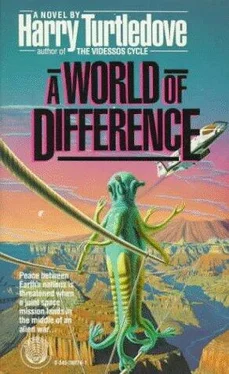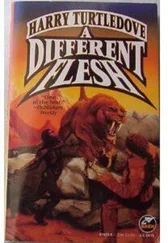“De, Sergei Konstantinovich, that is the one,” Voroshilov nodded.
“Katerina said it came from a fall.” Tolmasov’s features clouded. “If that is not so-”
“Yes, what then?” Rustaveli deliberately made his tone mocking. “What do you dare to do to a man with such, ah, influence?” The only way he saw to make Tolmasov take real action was to suggest he could not.
“I command here, not Lopatin.” The pilot’s words might have been graven in stone. Rustaveli made sure he did not smile. “I shall inquire further of Dr. Zakharova, and shall take whatever action I find appropriate,” the colonel went on. “Thank you for bringing this matter to my attention.” He turned his eyes back to the report, in its way a dismissal as formal as were his last couple of sentences, spoken for the record.
“He will do nothing,” Voroshilov predicted as soon as they were far enough from the tent to speak without Tolmasov’s hearing.
Rustaveli shook his head. “Tolmasov disdains to use his strength against the weak, but I should not care to be in his way after having done so myself.” He rubbed his gloved hands in anticipation of Lopatin’s comeuppance.
But the comeuppance did not come. Rustaveli waited for Tolmasov to travel down to Tsiolkovsky, for Lopatin to be peremptorily summoned to the tent, for orders or warnings to come from Earth. Nothing happened. Day followed day, busily, yes, but otherwise routinely.
Voroshilov waited, too, with growing unhappiness. He was always quiet. Now he turned downright taciturn-dangerously so, if Rustaveli was any judge. He tried to draw out the chemist and failed. Voroshilov answered only in grunts. Those were more than he gave either Tolmasov or Katerina, but they were not enough.
Fearing a brewing explosion under that silent mask, Rustaveli finally did what he had told himself not to: he talked with Katerina about the trouble. “Yuri worries about you,” he said as they walked through the marketplace of Hogram’s town.
“Why?” she asked. “I am a grown woman, Shota Mikheilovich, and quite able to care for myself.”
That gave the Georgian the opening he had hoped for. “Can you?” he countered quietly. “What of your ribs?”
She stopped so suddenly that a Minervan behind her had to swerve to keep from running into her. The male angrily waved arms and eyestalks as he went past. Katerina paid no attention. “Not you, too!” she said. “Sergei was after me about that last week. They’re almost healed-why make a fuss now?”
“Because I worry about you, too, Katya.”
Her eyes, challenging a moment before, softened. “Sweet of you, Shota, but truly, no need. I’m hardly even sore anymore.”
“A bruise is a bruise,” Rustaveli shrugged. “Where it comes from is something else again.”
“Sergei went on the same way.” Katerina tossed her head. “It came from my own clumsiness, nowhere else-I tripped over my own feet and fell against the edge of a lab table. Lucky I didn’t break a rib.”
If she was dissembling, Rustaveli thought, she had talent to go on stage. “I begin to think I have made a fool of myself,” he said slowly. He grinned. “Not for the first time, I fear.”
He did not win an answering smile from Katerina. “Will you please talk sense?” she snapped. “Did you think we would go through the whole mission without accidents? Even if you did, hasn’t Valery’s arm taught you better?”
“Without accidents, of course not. Without other things-“ “What other things?” She was starting to sound angry.
Tolmasov, Rustaveli realized, must have been so circumspect that Katerina had no idea what he was driving at. That made sense, in case Voroshilov’s accusation happened to be wrong. Rustaveli had not thought it was; it fit too well with what he knew-well, what he thought he knew-of Lopatin.
The Georgian sighed. He wished he had been more discreet himself. Actually, he wished he had kept his mouth shut. But since he hadn’t, he had to ask it straight out: “Then the chekist truly did not hit you?”
Her eyes widened-suddenly, he saw, all the roundabout questions fit together. “Oleg? No. He is…” Her grimace made her lack of enthusiasm plain, but she went on. “In his own way, he has discipline, too, Shota Mikheilovich. What he might like to do, I would sooner not think. But he values the mission, and holds himself in; one can tell such things.” She spoke calmly, dispassionately, then grew more urgent. “I value the mission, too; I want no trouble rising over me. Do you understand, Shota?”
“Da,” Rustaveli said, a little regretfully. “But you’d better let Yuri know. He is not thinking kindly thoughts of Oleg Borisovich Lopatin.”
“Yuri? He is so quiet, one never knows what he thinks. If he were to let loose of his temper-and isn’t Lopatin due up here tonight? Yuri!” she said again, in an entirely different tone of voice. “Bozhemoi!” She turned and ran in the direction of the tent as if she had forgotten Rustaveli was beside her.
And so, he thought as he watched her sidestep Minervans, she likely had. He supposed he should have felt virtuous, having saved the mission from what might well have been serious trouble. He did not feel virtuous. He was thinking of his grandfather instead. The old bandit was dead now, but he would have boxed Rustaveli’s ears if he ever found out his grandson had saved a KGB man a beating.
The Georgian laughed and swatted himself lightly on the earflaps of his cap. Penance paid, he followed Katerina back toward the tent.
The noise was so loud, it did not let Frank Marquard think. A few days before, he had looked down into Jotun Canyon, observed the flood, taken some pictures, and gone back to Athena conscious of nothing more than a job well done. Now he was a half a mile from the edge of the canyon, but the roar and boom coming up out of it were enough to stun. And the flood was just beginning.
He lifted the flaps of his cap and stuck in earplugs. They helped, but only somewhat. As at a rock concert, he still felt the noise through his feet, through his skin, and through his soft palate when he opened his mouth to breathe.
And with the earplugs in place, he could not talk to Enoph.
He took them out and tried to yell above drumroll and thunder.
“How you stand noise?”
The Minervan spoke through the din rather than over it, not raising his voice but talking more slowly so each word came out distinctly. “It happens every year,” he said. “We can get used to it or we can go mad. Getting used to it is easier.”
“I suppose so.” Frank tried speaking as Enoph had and found to his surprise that it worked. He had heard stories of men talking in normal tones under factory racket but had never believed them. Now he did.
The vibration of the ground grew more severe as he got closer and closer to the edge of the canyon, until it was like walking during a moderate earthquake. Being a Los Angeles native, Frank had done that more times than he cared to remember. Here, though, the shaking went on and on. He consoled himself by thinking that anything that could have shaken loose would have done so millions of years before. That reassured the rational part of him; the rest still wanted to find a doorway to stand in.
He crawled the last few feet to the edge of the canyon, not wanting to be pitched over it if a slab of ice or a boulder happened to smash into the side especially hard. As he looked down, though, awe cast away fear.
The mist above the waters was thick and sparkling, like a sundappled fogbank viewed from above. That was exactly what it was, Frank realized. It would have concealed a great deal on Earth but it could not hide the Minervan floods.
Water thundered, roared, bellowed, cast itself upward off obstacles or off itself, and flung iceberg fragments and great stones into the air with mindless abandon. Frank squeezed off several pictures, knowing none of them could convey the sheer scale of what he was seeing. It was like watching gray whales mate in deep water. He had done that once, off the California coast.
Читать дальше












